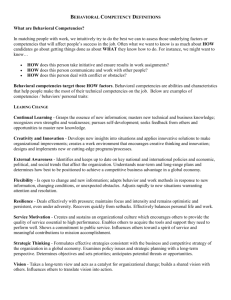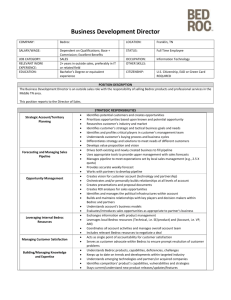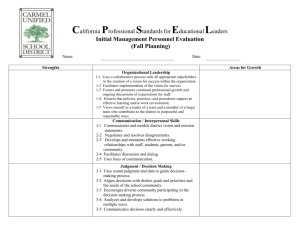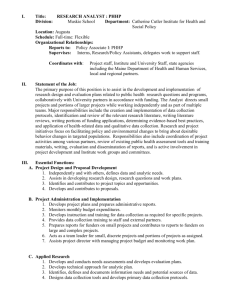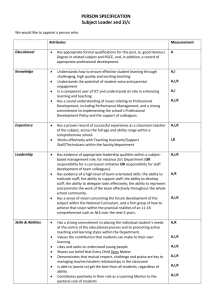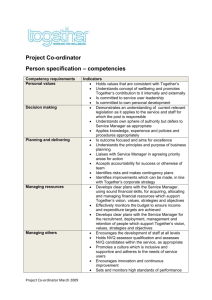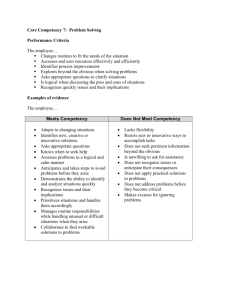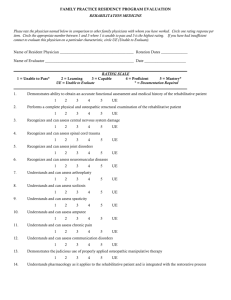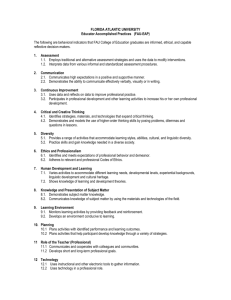Domestic Violence Grading Criteria
advertisement
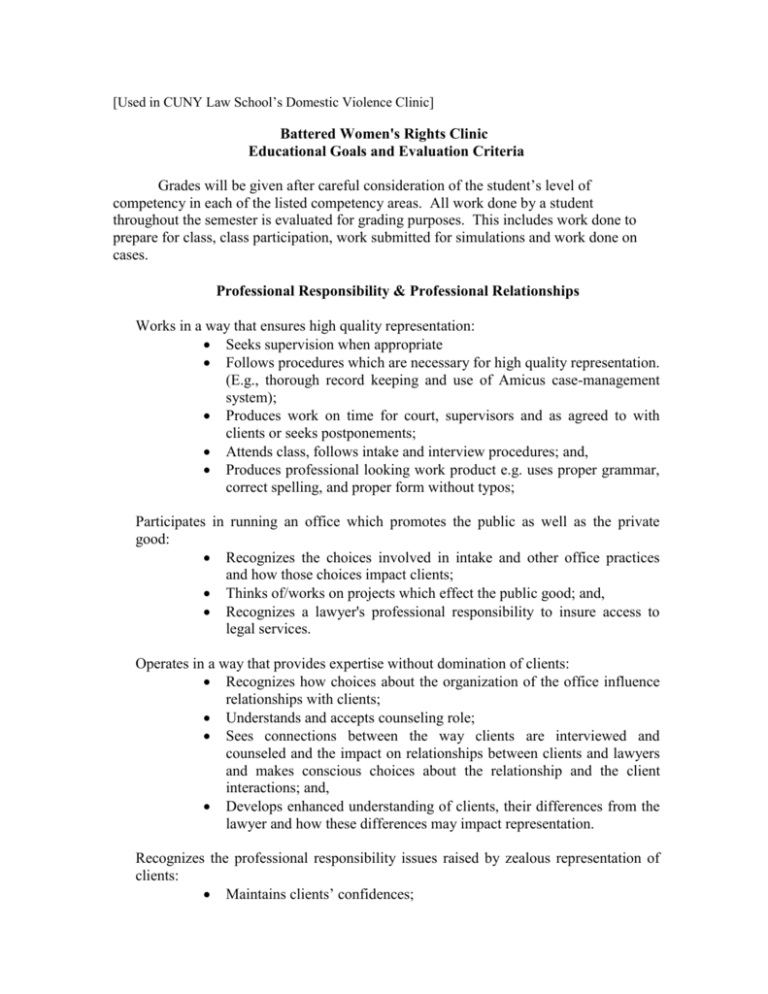
[Used in CUNY Law School’s Domestic Violence Clinic] Battered Women's Rights Clinic Educational Goals and Evaluation Criteria Grades will be given after careful consideration of the student’s level of competency in each of the listed competency areas. All work done by a student throughout the semester is evaluated for grading purposes. This includes work done to prepare for class, class participation, work submitted for simulations and work done on cases. Professional Responsibility & Professional Relationships Works in a way that ensures high quality representation: Seeks supervision when appropriate Follows procedures which are necessary for high quality representation. (E.g., thorough record keeping and use of Amicus case-management system); Produces work on time for court, supervisors and as agreed to with clients or seeks postponements; Attends class, follows intake and interview procedures; and, Produces professional looking work product e.g. uses proper grammar, correct spelling, and proper form without typos; Participates in running an office which promotes the public as well as the private good: Recognizes the choices involved in intake and other office practices and how those choices impact clients; Thinks of/works on projects which effect the public good; and, Recognizes a lawyer's professional responsibility to insure access to legal services. Operates in a way that provides expertise without domination of clients: Recognizes how choices about the organization of the office influence relationships with clients; Understands and accepts counseling role; Sees connections between the way clients are interviewed and counseled and the impact on relationships between clients and lawyers and makes conscious choices about the relationship and the client interactions; and, Develops enhanced understanding of clients, their differences from the lawyer and how these differences may impact representation. Recognizes the professional responsibility issues raised by zealous representation of clients: Maintains clients’ confidences; Researches, develops theories and investigates facts in a conscientious manner; and, Interacts with Court, opposing counsel and court personnel appropriately. Works well with colleagues for the benefit of clients and the office: Produces work in a timely fashion so that others can give feedback on and contribute to joint work product; Shares individual work product and research with colleagues when appropriate; Contributes to the educational environment by sharing information and providing feedback to colleagues; Works collaboratively with other professionals to identify appropriate roles and tasks for lawyers and social workers; and, Contributes to the overall service goals of the office by helping others with intake, client cases. Clinical Judgment Generates a variety of options for solving clients' problems: Identifies client's concerns in ways that see their complexity; Identifies legal and non-legal alternatives for addressing client's problems; and, Identifies strengths and weaknesses of various options to solve client’s problems. Develops effective strategies for litigating and negotiating: Identifies known facts, investigates and discovers unknown facts; Generates multiple theories of the case and evaluates them; Generates tasks to be completed to prepare for litigation and creates appropriate strategies for completing tasks; and Identifies possible solutions to the litigation. Anticipates potential problems and raises them with the client. Learns from experience Uses feedback from teachers and colleagues to improve performance; Reflects on experiences and develops tentative ideas about new approaches to try; and, Uses lawyering theory from seminar and simulation and explores the appropriateness of the planned approach. Understands the role that others in helping professions can play and refers appropriate cases to other professionals. Demonstrates knowledge of social work and the role that social workers can play in litigation and non-legal solutions to the client’s problems. Legal Reasoning Develops a working knowledge of the Family Court Act, the Domestic Relations Law, and the Immigration Law affecting battered women and can apply the law to client’s cases. Frames issues for research. Understands and applies legal research to client's problems. Develops theories of the case consistent with the applicable law and client's goals. Uses the law creatively to accomplish client's goals. Identifies the limits of the law and the needed for law reform efforts to promote client well-being. Theoretical Perspective Understands the value and limitations of developing a definition of the role of the lawyer. Understands the choices in defining the lawyer's role in relationship with clients, courts and adversaries and the implicit assumptions in the various choices. Develops a critique on how law enforces family norms. Develops critical perspectives on how law is practiced. Recognizes that individual case analysis occurs within a context: Understands battered women's syndrome and other theories about battering; Applies other theoretical frameworks for analyzing a client's situation including sexism, racism, poverty, and heterosexism; and, Integrates an understanding of family violence in designing theories of the case and solutions for clients cases. Develops strategies for working on clients' problems that go beyond individual casework. Communication Drafting: Drafts pleadings and motions that are clear, carefully written and persuasive that take into account the client’s narrative and legal requirements; Interviewing and counseling: Demonstrates capacity to build rapport with clients and others; Uses questions in a manner to elicit information; Listens effectively in a manner that promotes rapport and information exchange; Recognizes personal biases that effect listening and communicating; and, Communicates information appropriately to clients. Other professional communications: Writes letters that are clear and carefully written with suitable tone and language; Presents educational programs that are appropriate to the audience and accomplish the goals of the presentation; and, Appropriate communication with colleagues, courts, community advocates and adversaries that consider the audience and purpose of the communication. Courtroom advocacy: Designs and communicates a persuasive theory of the case that integrates narrative and legal theory; Plans for and questions effectively to obtain and/or challenge relevant information and listens to responses; Identifies and presents documentary and other evidence; and, Presents arguments in clear effective manner; Management of Effort Works cooperatively with colleagues. Seeks appropriate supervision in the development of case work. Attends all classes, training sessions and clinic office meetings. Plans work effectively to meet demands of studying, exams, free time, and court/clinic work. Meet deadlines imposed/agreed to by courts, clients, colleagues, supervisors, and opponents. Keeps time records and inputs time information close to contemporaneously as possible. Maintains files in a manner that promotes efficiency.
